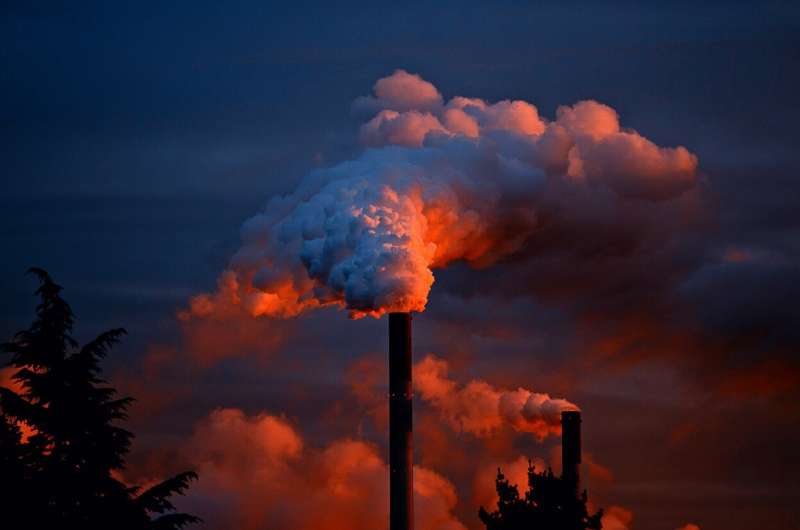This article has been reviewed according to Science X's editorial process and policies. Editors have highlighted the following attributes while ensuring the content's credibility:
fact-checked
peer-reviewed publication
trusted source
proofread
Corruption can increase environmental efficiency and improve economy in developing countries, study argues

It is possible for corruption to lead to better environmental efficiency and improved economy in developing countries, according to a recent study published in the Journal of Cleaner Production.
The study presents a novel Bayesian data envelopment analysis (DEA) approach to examine cross-country environmental efficiency. Though in line with at least a chunk of the literature on environmental efficiency, the findings may stun green activists and environment-friendly media as the researchers confine the inverse relationship between levels of pollution and levels of corruption merely to developing countries.
"Corruption could facilitate economic activity and improve environmental efficiency for countries with weak institutions," argues the study's corresponding author Dr. Panagiotis Zervopoulos of the University of Sharjah in the United Arab Emirates.
"In line with the economic growth and part of the environmental efficiency literature, this work identified an inverse relationship between the control of corruption and developing countries' environmental efficiency."
The inverse correlation is found to be "statistically significant" in developing countries, "while it is not statistically significant for developed countries. Additionally, developed countries' environmental efficiency is not affected by formal institutional factors but rather by environmental policies," notes Dr. Zervopoulos.
The study's findings are based on Bayesian Data Envelopment Analysis (DEA) using a panel of developed and developing countries spanning from 2002 to 2019.
The sample consists of 144 countries, where 35 are classified as developed and the remaining 109 as developing, according to the International Monetary Fund (IMF) World Economic Outlook database.
Assessing cross-country environmental efficiency by analyzing labor, capital stock, energy consumption, GDP, and CO2 emissions, the authors claim their investigation is the first to elaborate the effect of institutional factors on environmental efficiency, leaning on the Bayesian DEA approach.
The authors' inverse link between corruption on one hand and pollution on the other assumes considerable significance with world leaders soon flocking to the UAE, where the authors are based, to attend the global climate summit, COP28, to be held in Dubai from 30 November until 12 December 2023.
While the study's findings expand prevalent environment efficiency theories, Dr. Zervopoulos is quick to note that "it should not be interpreted as a justification for the presence of corruption" since developed countries, endowed with strong institutions, are "expected to have higher environmental efficiency than their developing counterparts."
"The effect of lagged environmental efficiencies on current environmental performance is strong and statistically significant, signifying the need for countries' commitment to regulate energy consumption and CO2 emissions further, as well as to take actions supporting sustainable and resilient growth."
The study investigates relationships among formal institutions, taking into consideration variables like voice and accountability, political stability, no violence, government effectiveness, regulatory quality, rule of law, and control of corruption. It acknowledges that a country's classification—in this case developing or developed—plays a significant role in the environmental efficiency level.
Asked what developing countries need to do to combat pollution, Dr. Zervopoulos said, "Developing countries should consider improving factors, such as the human development index (HDI), to transform into developed." HDI, a proxy of a country's health, education, and wealth, is one of the criteria for classifying countries as developed or developing, according to the IMF.
Dr. Zervopoulos lauds developing countries for putting "significant effort into improving their HDI ranking, reaching, on average, the highest level in 2020, showing a gradual convergence in HDI between developing and developed countries."
The study, according to its lead author Jawahir Alshehhi, a doctoral candidate at the University of Sharjah, has "significant country-level policy implications for the improvement of environmental performance, such as the need for countries' commitment further to regulate energy consumption and CO2 emissions and efforts to improving non-environmental factors such as the human development index (HDI)."
Moreover, the study's implications, adds Alshehhi, extend to institutions which "shape the macro environment of a country and steer its economic success and failure. Institutions use contextual controls to establish and regulate public laws and regulations."
"Thus, corruption in weaker institutions like those of developing countries benefits the environment efficiency, while strong institutional settings like those in developed countries exercise more control over corruption with their firmer laws and regulations."
More information: Jawahir M. Alshehhi et al, The effect of institutional factors on environmental efficiency: A cross-country analysis using a Bayesian data envelopment analysis approach, Journal of Cleaner Production (2023). DOI: 10.1016/j.jclepro.2023.136401
Journal information: Journal of Cleaner Production
Provided by University of Sharjah





















